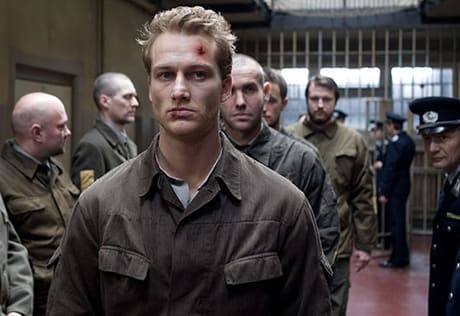Set in early '80s East Germany, Toke Constantin Hebbeln's sophomore directorial outing, Shores of Hope, plays like a heightened, melodramatic variation on The Lives of Others, only with a slightly more Americanized, less intimate take on the nature of Stasi surveillance and manipulation.
Similarly, the themes are broader, highlighting the importance of the titular hope and perseverance in the face of contrary, abject morality, which is decidedly appropriate for a contextual ideology defined by interference and control tactics.
Here, dockworker Cornelis Schmidt (Alexander Fehling) and close friend Andreas (August Diehl) dream of being assigned sailor duty, which acts as an overt metaphor for freedom from the passive psychological torture of their day-to-day life on land. Knowing of their desire for partial freedom, Stasi leaders dangle a carrot in front of their faces, offering opportunity should they acquire proof that their foreman, Matthias (Ronald Zehrfeld), plans to flee East Germany, which is a moral debate that ultimately divides the righteous Cornelis and the self-preserving Andreas.
Most of the film takes place in a prison, with Cornelis being punished after trying to escape with his Vietnamese girlfriend – there on a cultural exchange program and resultantly forbidden to him romantically – over the Czech border. While she makes it, he winds up confined to a cell with Matthias, the man he almost betrayed, unaware that Andreas is lying to him through correspondence in order to move ahead in the Stasi ranks.
Constructed as a classic narrative with a mature aesthetic, the drama unfolds predictably, with an exaggerated score and foreboding close-ups guiding our feelings and perspective along the way. This makes it easy to know what to think and what to root for, as does the overly heroic and altruistic characterization of the central protagonist.
While the juxtaposition of betrayal rewarded and honour punished establishes a contrary and hostile East German ethos, the overly simplistic way that each character is defined and developed proves more patronizing than moving.
Making black and white the nature of government oppression isn't particularly challenging, which is why more nuanced humanity and the occasional shade of grey might have made this the epic it's trying so desperately to be.
(UFA)Similarly, the themes are broader, highlighting the importance of the titular hope and perseverance in the face of contrary, abject morality, which is decidedly appropriate for a contextual ideology defined by interference and control tactics.
Here, dockworker Cornelis Schmidt (Alexander Fehling) and close friend Andreas (August Diehl) dream of being assigned sailor duty, which acts as an overt metaphor for freedom from the passive psychological torture of their day-to-day life on land. Knowing of their desire for partial freedom, Stasi leaders dangle a carrot in front of their faces, offering opportunity should they acquire proof that their foreman, Matthias (Ronald Zehrfeld), plans to flee East Germany, which is a moral debate that ultimately divides the righteous Cornelis and the self-preserving Andreas.
Most of the film takes place in a prison, with Cornelis being punished after trying to escape with his Vietnamese girlfriend – there on a cultural exchange program and resultantly forbidden to him romantically – over the Czech border. While she makes it, he winds up confined to a cell with Matthias, the man he almost betrayed, unaware that Andreas is lying to him through correspondence in order to move ahead in the Stasi ranks.
Constructed as a classic narrative with a mature aesthetic, the drama unfolds predictably, with an exaggerated score and foreboding close-ups guiding our feelings and perspective along the way. This makes it easy to know what to think and what to root for, as does the overly heroic and altruistic characterization of the central protagonist.
While the juxtaposition of betrayal rewarded and honour punished establishes a contrary and hostile East German ethos, the overly simplistic way that each character is defined and developed proves more patronizing than moving.
Making black and white the nature of government oppression isn't particularly challenging, which is why more nuanced humanity and the occasional shade of grey might have made this the epic it's trying so desperately to be.
